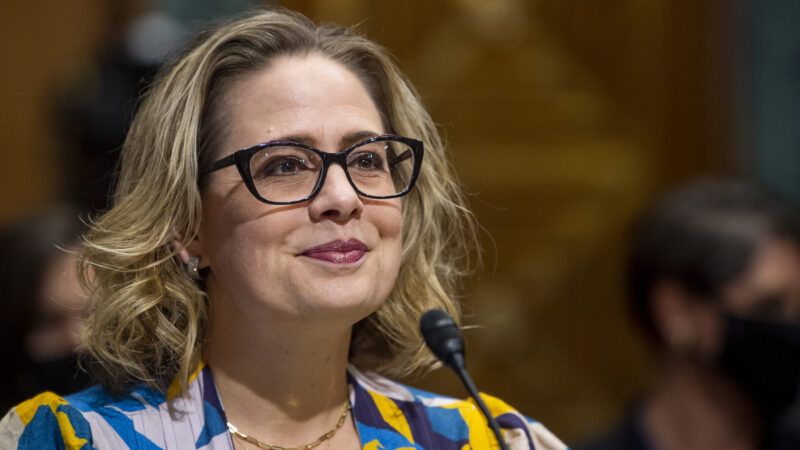Sen. Sinema Savages Democrats' Shortsighted Filibuster Sabotage
Both parties want to kill the filibuster when they are in the majority, and that's exactly why it needs to stick around.

In an impassioned speech on the Senate floor Thursday afternoon, Sen. Kyrsten Sinema (D–Ariz.) reiterated her opposition to nuking the filibuster, a maneuver she warned would only further undermine American democracy by clearing the way for lawmakers to pass divisive laws.
Sinema said she "strongly supports" two bills Democrats are trying to pass to overhaul the rules governing federal elections. She also decried Republican-led efforts to restrict voting in some states—efforts that she said "have no place in a nation whose government is formed by free, fair, and open elections"—and endorsed legal and legislative attempts to stop them.
But she doesn't think they're a good reason to roll back the filibuster. "While I continue to support these bills, I will not support separate actions that worsen the underlying disease of division infecting our country," Sinema said. She added that the filibuster protects the country from "wild reversals in federal policy" and ensures that minority views are protected.
"Eliminating the 60-vote threshold will simply guarantee that we lose a critical tool that we need to safeguard our democracy from threats in the years to come," she concluded.
Sinema's been saying as much for months, but she has been back in the spotlight this week after President Joe Biden declared Tuesday that he was willing to kill the filibuster in order to pass that pair of election bills. Biden compared senators defending the filibuster—including Sinema and Sen. Joe Manchin (D–W.Va.)—to the likes of Confederate President Jefferson Davis and segregationist Gov. George Wallace.
Biden stressed that abolishing the filibuster would allow the majority to prevail in the Senate. But when it comes to overturning the filibuster, the majority is prevailing—Democrats have, at most, only 48 votes to change the rules.
In stark contrast to Biden's remarks, Sinema's speech offered articulate and nuanced reasons for keeping the Senate's 60-vote threshold for passing legislation.
She noted that each party's views on the filibuster seems to change each time the Senate majority does, making the 60-vote requirement either a "frustration" or a "safety net" depending on which side is in control. Democrats used the filibuster on several occasions to stop President Donald Trump's proposed policies, just as Republicans used the rule to slow President Barack Obama's agenda.
"What is the legislative filibuster other than a tool that requires new federal policy to be broadly supported by senators representing a broader cross-section of Americans?" Sinema asked. "Demands to eliminate this threshold, from whichever party holds the fleeting majority," have made political rifts deeper and wider.
Recent history bears that out. In 2013, then–Senate Majority Leader Harry Reid (D–Nev.) abolished the filibuster for lower-court judicial nominees, ostensibly to let Democrats confirm more of then-President Barack Obama's picks for the federal bench. How did that work out in the long run? President Donald Trump and a Republican-controlled Senate installed nearly as many federal judges in four years as Trump's predecessor did in eight—prompting liberals to howl about a conservative overhaul of the federal courts.
Republicans then took the next step, abolishing the filibuster for Supreme Court nominees. The result? The Supreme Court nomination and confirmation process became even more of a political circus.
As Sen. Mitt Romney (R–Utah) warned Democrats earlier this week, abolishing the legislative filibuster will grease the skids for a future Republican administration to push through new policies that Democrats would otherwise be able to stop.
"There is also a reasonable chance Republicans will win both houses in Congress, and that Donald Trump himself could once again be elected president in 2024," he said. "Have Democrats thought what it would mean for them—for the Democrat minority—to have no power whatsoever?" If that future comes to pass, Democrats will owe Sinema an apology.
Perhaps the most important thing Sinema said during Thursday's speech had little to do with the zero-sum game of vote-counting in the Senate.
Calls to abolish the filibuster, Sinema argued, amount to one political party saying that it has the singularly correct vision for how American should operate.
She's right. Career partisans and true believers might want to do whatever is necessary to make their team win, but a healthy democracy relies on a diversity of views and a balance of opinions. The filibuster may not be able to survive in a political culture where every issue becomes a life-or-death struggle for power, but the debate over the filibuster has become a useful proxy for demonstrating why that sort of culture is corrosive. A democratic society functions only when one faction knows it can't single-handedly write the rules for everyone else.
In short, a senator should be able to support certain policy ideas while also recognizing that he or she won't always get the desired outcome. That's what Sinema is doing by refusing to smash the system to pass a bill she likes.
"When one party need only negotiate with itself, policy will inextricably be pushed from the middle towards the extremes," Sinema said. "It is clear that the two parties' strategies are not working—not for either side and especially not for the country."
